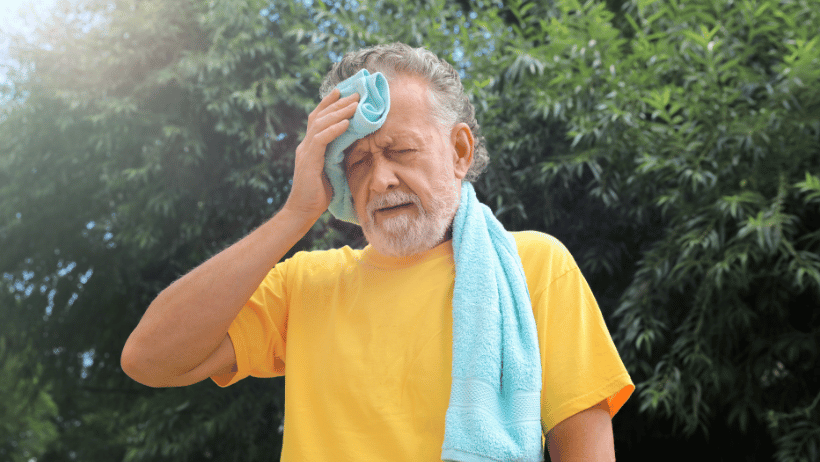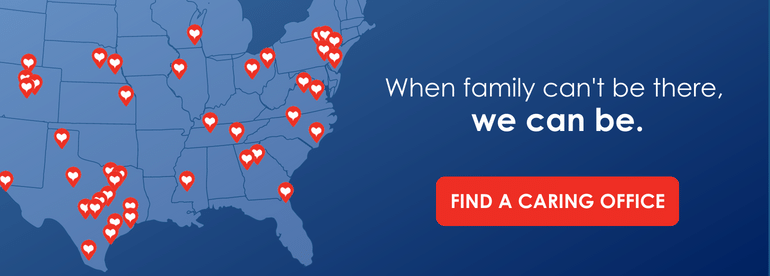As the summer heat intensifies, it becomes crucial to take extra precautions to ensure the safety and well-being of seniors. The elderly are particularly vulnerable to heat-related illnesses. So, caregivers and family members must be prepared to protect them from rising temperatures. Let's dive into some hot weather safety tips to help keep your aging loved ones safe this summer.
Understanding the Risks for Seniors & Extreme Heat
To effectively safeguard seniors from the summer heat, it helps to understand the risks associated with high temperatures. Elderly individuals are prone to heat-related conditions due to their decreased ability to regulate body temperature. Factors such as chronic medical conditions, certain medications, and limited mobility can further exacerbate the risks. Even if they are relatively healthy, seniors can start experiencing heat-related health problems when the temperature passes 80 degrees.
Here are some of the common heat-related illnesses that affect seniors:
- Heat cramps
- Heat edema (swelling)
- Heat syncope (dizziness)
- Heat rash
- Heat exhaustion
- Heat stroke
- Sunburn
If a senior does not get out of the heat in time, they may suffer from greater risks — even death. By recognizing these vulnerabilities, you can better implement preventive summer safety tips.
Heat Safety Tips for Older Adults
When caring for a senior during the summer, keep these tips in mind to help them stay cool and stay safe.
Stay Hydrated
Dehydration is a significant concern for seniors during the summer. Encourage your loved ones to drink plenty of fluids, even if they don't feel thirsty. Optimal hydration helps regulate body temperature and prevents complications.
Ensure they have access to water throughout the day, and consider offering hydrating alternatives like fruit-infused water or herbal teas. Additionally, limit their consumption of caffeinated and alcoholic beverages because they can actually contribute to dehydration.
RELATED CONTENT: 5 Surprising Ways to Prevent Dehydration
Create a Cool Environment
Maintaining a cool indoor environment is essential for seniors during the summer. Use air conditioning or fans to lower the temperature in the home and provide relief from the heat. Make sure the cooling systems are functioning properly, and keep windows and curtains closed during the hottest parts of the day.
If air conditioning is not available, try cooling centers, senior centers or public places with air conditioning to provide relief. You could also encourage your loved one to take a cold shower or bath.
Wear the Right Clothing
Choosing appropriate clothing can significantly impact a senior's comfort level during hot weather. Encourage them to wear loose-fitting, lightweight, and breathable fabrics like cotton or linen. Light-colored clothing reflects sunlight and can help reduce heat absorption. Additionally, hats with wide brims and sunglasses can provide protection against direct sun exposure.
Time Outdoor Activities Wisely
During the summer, keep an eye out on the forecast, including temperature and heat index. Planning will be key for hot days! You should periodically check the weather throughout the day since the forecast can change and unexpected spikes in temperature can occur.
When the summer heat is at its peak, it's important to plan outdoor activities strategically. Encourage seniors to limit their time outdoors during the hottest hours of the day, typically from late morning to mid-afternoon. Instead, plan outings or physical activities during cooler morning or evening hours. If you do go out, shaded areas, such as parks with trees, can offer relief from the sun's intensity.
Promote Sun Safety
Sunburns can be painful and increase the risk of heat-related illnesses. Help seniors apply sunscreen with a high sun protection factor (SPF) before going outside. When wearing sunscreen, opt for broad-spectrum sunscreens that protect against both UVA and UVB rays. Provide them with access to shade or umbrellas when spending time outdoors.
RELATED CONTENT: Summer Skin Safety Tips for Seniors
Monitor Medications
Some medications can make seniors more susceptible to heat-related issues. Review your loved ones' medications with their healthcare provider to identify any that may increase sensitivity to heat or affect hydration. Inquire about potential side effects and determine if adjustments or alternative medications are necessary.
Regularly Check-In
Regular check-ins are crucial to ensure the well-being of seniors during the summer months. If possible, visit or call them frequently to assess their comfort, hydration, and overall health. Encourage open communication so they can express any concerns or symptoms of heat-related illnesses. Additionally, remind them to reach out for assistance if needed.
Seek Medical Attention if Necessary
Despite taking preventive measures, seniors can still be susceptible to heat-related illnesses. It's essential to recognize the warning signs, such as dizziness, nausea, rapid heartbeat, confusion, or fainting. If any of these symptoms occur, seek immediate medical attention. Heat-related illnesses can escalate rapidly, and prompt medical intervention is vital.
Protecting seniors from the dangers of summer heat requires proactive measures and a comprehensive approach. By taking preventative measures, you can effectively safeguard the well-being of your elderly loved ones during the hot summer months. For more information on how to keep seniors safe at home during the summer, reach out to your local Caring team.


